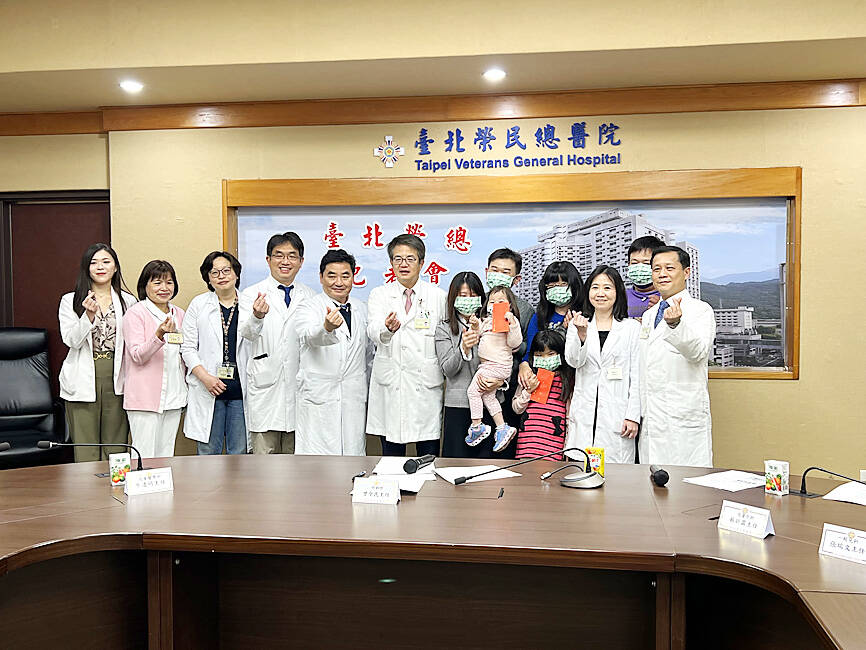Surgeons overcame several obstacles to successfully complete an organ transplant surgery for a three-year-old with inherited kidney disease, Taipei Veterans’ General Hospital said yesterday.
The patient, a girl surnamed Hsu (許), was diagnosed with polycystic kidney disease, a rare genetic disorder, at birth, the hospital told a news conference.
She has taken medication and had dialysis daily since she was two, and the condition limited her growth, it said, adding that at 86.3cm and 11.5kg, she is shorter and lighter than most other children her age.

Photo: CNA
Pediatric Surgery Division director Tsai Hsin-lin (蔡昕霖) said that most children who need a kidney transplant have inherited urinary system abnormalities, glomerulonephritis, acute kidney damage or other genetic disorders.
However, dialysis can cause delays in physical and neurocognitive development in young children, Tsai said.
As their bodies are so small, surgery on the urinary system of children with chronic kidney disease is more complicated, but if they do not get a kidney transplant before adulthood, the stunting of their growth might worsen, leading to learning disabilities, uremia, anemia, or even acute stroke or heart attack, he said.
Getting a transplant is a race against time, he added.
Another issue is that most kidney donors are adults, Tsai said.
After waiting a year for a compatible kidney from a donor who weighed 57kg, the big challenge for the surgical team was how to implant a 12cm-long kidney into Hsu’s abdominal cavity, which was only about 20cm long, he said, adding that the organ they removed was 8cm long.
The team had to precisely calculate the dimensions of Hsu’s abdominal cavity and the operation took seven hours, he said.
The surgeons removed the damaged kidney, moved her large intestine and duodenum to the left to make room for the donor kidney and connected blood vessels to it to prevent tubular necrosis, he said.
The team also reported the successful cases of a nine-year-old child, surnamed Chen (陳) and four other kidney transplants involving children since August 2020.
Pediatric Division director Chang Jei-wen (張瑞文) said that a kidney transplant is the best treatment for children with end-stage renal disease, as it not only has the best prognosis, but can also allow a young patient’s physical and cognitive growth to catch up with children of the same age.

ENDEAVOR MANTA: The ship is programmed to automatically return to its designated home port and would self-destruct if seized by another party The Endeavor Manta, Taiwan’s first military-specification uncrewed surface vehicle (USV) tailor-made to operate in the Taiwan Strait in a bid to bolster the nation’s asymmetric combat capabilities made its first appearance at Kaohsiung’s Singda Harbor yesterday. Taking inspiration from Ukraine’s navy, which is using USVs to force Russia’s Black Sea fleet to take shelter within its own ports, CSBC Taiwan (台灣國際造船) established a research and development unit on USVs last year, CSBC chairman Huang Cheng-hung (黃正弘) said. With the exception of the satellite guidance system and the outboard motors — which were purchased from foreign companies that were not affiliated with Chinese-funded

PERMIT REVOKED: The influencer at a news conference said the National Immigration Agency was infringing on human rights and persecuting Chinese spouses Chinese influencer “Yaya in Taiwan” (亞亞在台灣) yesterday evening voluntarily left Taiwan, despite saying yesterday morning that she had “no intention” of leaving after her residence permit was revoked over her comments on Taiwan being “unified” with China by military force. The Ministry of the Interior yesterday had said that it could forcibly deport the influencer at midnight, but was considering taking a more flexible approach and beginning procedures this morning. The influencer, whose given name is Liu Zhenya (劉振亞), departed on a 8:45pm flight from Taipei International Airport (Songshan airport) to Fuzhou, China. Liu held a news conference at the airport at 7pm,

GRIDLOCK: The National Fire Agency’s Special Search and Rescue team is on standby to travel to the countries to help out with the rescue effort A powerful earthquake rocked Myanmar and neighboring Thailand yesterday, killing at least three people in Bangkok and burying dozens when a high-rise building under construction collapsed. Footage shared on social media from Myanmar’s second-largest city showed widespread destruction, raising fears that many were trapped under the rubble or killed. The magnitude 7.7 earthquake, with an epicenter near Mandalay in Myanmar, struck at midday and was followed by a strong magnitude 6.4 aftershock. The extent of death, injury and destruction — especially in Myanmar, which is embroiled in a civil war and where information is tightly controlled at the best of times —

Taiwan was ranked the fourth-safest country in the world with a score of 82.9, trailing only Andorra, the United Arab Emirates and Qatar in Numbeo’s Safety Index by Country report. Taiwan’s score improved by 0.1 points compared with last year’s mid-year report, which had Taiwan fourth with a score of 82.8. However, both scores were lower than in last year’s first review, when Taiwan scored 83.3, and are a long way from when Taiwan was named the second-safest country in the world in 2021, scoring 84.8. Taiwan ranked higher than Singapore in ninth with a score of 77.4 and Japan in 10th with